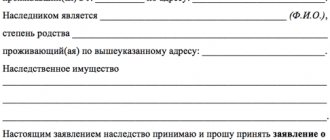Each of us encounters security guards almost every day: in offices, grocery stores, shopping centers, banks, theaters, etc. As a rule, the security of such facilities is carried out by employees of private security companies (PSCs). Their rights and obligations are enshrined in the relevant law “On private detective and security activities in the Russian Federation.” But it applies only to employees of licensed private security companies who wear a special uniform and have certificates. If a person wears a security guard badge, but the store hired him “off the street,” he does not have any special powers that distinguish him from ordinary citizens.
Questions and answers Can a security guard detain a buyer?
What rights do security guards have?
The powers of private security guards are limited to the duties of protecting facilities and property, ensuring intra-facility and access control, and protecting the life and health of citizens.
According to Art. 12.1 of the Law “On Private Detective and Security Activities in the Russian Federation”, in accordance with the contract for the provision of security services, employees of private security companies, when ensuring intra-facility and access control, have the right:
- require staff and visitors to comply with internal and access control regulations;
- allow persons to enter facilities with access control upon presentation of documents giving them the right to enter or exit, enter or exit vehicles, bring in (import) or take out (export) property;
- inspect entering or leaving vehicles at access-controlled facilities;
- use physical force, special means and firearms in special cases established by the legislation of the Russian Federation;
- provide assistance to law enforcement agencies.
CHOP with them! Why does Russia need so many security guards Read more
What types of guards are there?
Shops, offices, enterprises may be under the protection of different structures:
- The Ministry of Internal Affairs, and specifically its division - Private Security. They are not constantly on site, but come when called;
- Private security company (or simply private security company). It is the workers of these organizations, security guards in black and blue uniforms, who can be found in any public place that is constantly guarded.
Since you can most often find a security guard of a private company in stores, we will talk about his rights, which are fundamentally different from the powers of employees of the Ministry of Internal Affairs.
Can a store security guard require you to put things in a storage room?
Store security guards do not have the right to require visitors to leave personal belongings in a storage room or to pack them in a bag. They also cannot block the entrance to the store if a person refuses to comply with such requirements.
In the event of a violation, the security guard should be reminded that forcing customers to enter into an agreement to store personal items in a store storage room is illegal. If he continues to block access to the store with personal belongings, you should ask him to invite the administrator of the institution and find out on what basis the employee is acting. If you are told that the security guard acts in accordance with the store’s internal instructions, this is not an argument, since local regulations cannot contradict the law.
For the same reasons, a security guard cannot require store visitors to take a basket and prohibit them from putting goods in their bag or bag before paying for them.
Rights of a security guard in a store
Many security guards allow themselves more than they are allowed, citing Article 12.1 of the previously mentioned law, which states that the security officer has the right to demand compliance with the requirements established within the facility.
However, it is silent that the law contains an indication that these requirements should not conflict with the law. Attention! The security guard has the only right that cannot be challenged - surveillance of persons and detention of offenders.
The detention procedure should under no circumstances involve violence. But physical force can and should be used in order to stop a criminal or defend oneself. But more on that later.
Read also: What to do if you are not allowed to go on vacation
Let's figure out what actions a security guard has the right to perform in relation to store visitors using the example of frequent cases.
Does a store security guard have the right to search you?
A personal search is a forced examination of a citizen, his personal belongings, and clothing. An employee of a private security company does not have the right to conduct a search. Moreover, even if the fact of theft is obvious.
The security guard may ask the citizen to show what he took, but the latter has the right to refuse. In this case, he detains the suspect until the police arrive.
What if the guard thinks I stole something?
To call law enforcement officers, the security guard must have serious reasons to believe that the store visitor has committed an offense.
This could be an alarm going off at the exit of a store and a citizen refusing to show his bag, extremely suspicious behavior (typical of inexperienced thieves), and, of course, if there are witnesses to the theft in the store.
Such circumstances require detaining the suspect and calling the police. Police officers carry out searches in compliance with the law - in the presence of witnesses, with the subsequent drawing up of a protocol.
Does the security guard have the right to detain you until the police arrive?
Yes, this is exactly what he should do if there is a suspicion that he has committed a crime.
Moreover, the methods and force with which the guard carries out the arrest must be proportionate to the severity of the offense. Thus, the guard cannot throw a person to the floor and twist his arms for a stolen pack of cookies. If the case goes to trial, these factors will be taken into account by the court. Thus, if a security guard abuses his position, he may be deprived of the right to carry out security activities and brought to administrative and even criminal liability.
What if I didn’t steal anything, but I’m detained?
The best solution would be to prove your innocence to the guard, i.e. show your bag, pockets, etc.
But if the detention was accompanied by the use of physical force, then you need to call the police. There is a separate article in the Criminal Code of the Russian Federation 203 (Criminal Code of the Russian Federation) about abuse of official powers by employees of private security companies.
Unlawful actions of a security guard are punishable by a fine of 100-300 thousand rubles or imprisonment/forced labor for up to 2 years.
Article 203 of the Criminal Code of the Russian Federation “Excess of authority by a private detective or an employee of a private security organization holding a private security guard certificate when performing their official duties”
Does a store security officer have the right to use physical force?
The use of physical force is provided for in Article 16 of the current law. But there are many subtleties and restrictions that a security guard needs to remember in order to keep his activities within the legal framework:
- Use sufficient force to restrain the offender in the store before turning him over to law enforcement;
- Follow the regulated procedure - a warning about the intention to use force, minimize the consequences, provide first aid if necessary.
The security guard must independently weigh his actions against the resistance exerted by the offender.
Does a security guard have the right to check a cash receipt?
Such a check is not mentioned in any of the current laws, so the security guard has no right to demand the presentation of a receipt.
Read also: Registration of price tags in 2021: legislative framework
Moreover, according to Article 18.5 of the Law of the Russian Federation No. 2300-1 “Protection of Consumer Rights,” the buyer has the right not to take the check at all when leaving the cash register.
Law of the Russian Federation dated 02/07/1992 No. 2300-1 “On the protection of consumer rights”
Does the security guard have the right not to let me into the store with my bag?
Almost all modern markets have storage lockers.
The buyer can leave his things in them during his stay in the sales area. In the past, guards often offered to leave their belongings in the cell. Is such an offer legal? Of course not. A visitor can give two arguments to prove that he is right:
- There is no legislation that would prohibit visiting a store with personal belongings;
- There is no guarantee that things left in the locker will be safe, since in any store there is a notice: “The administration is not responsible for things left in the storage room.”
Advice! If a security guard forces you to leave things in a locker, you can safely refuse the request, and if something happens, threaten to call the police. Usually, when security sees a visitor's serious attitude, they retreat.
As a rule, a conversation with the administrator is enough.
Thus, storage lockers are created solely for the convenience of the buyer. Their use is voluntary and not mandatory.
Does a security guard have the right to prohibit photography of goods?
No.
If the trend of not being allowed into the sales area with a bag is gradually becoming less relevant, then the ban on photo and video shooting in the store still works. Many people find themselves in a similar situation. For example, when you need advice on choosing clothes, a person takes a photo to send to a friend. At this moment, a security guard comes up and asks you to stop.
But this is a violation of the constitutional rights of a person to receive, transmit, reproduce and distribute legally obtained information. The Civil Code of the Russian Federation does not prohibit taking photographs in stores.
What if the security guard prohibits taking photographs?
You need to contact the store administrator or a senior employee at a private security company.
Is it possible to film a security guard?
According to the Civil Code of the Russian Federation, filming a person is allowed in all public places if he is not the main subject of filming.
Note! Individual filming of a person is permitted if the recording will be used in the state or public interest.
The category of such interests also includes the use of video as evidence in court. Therefore, it is not only possible, but also necessary to film a conversation with a security guard; this will help in defending your position in court.
Can a security guard ask for a passport?
We are talking about a pass to the office - maybe.
However, here everything is not so simple. The citizen needs to make sure that this requirement is being made legally. This is easy to find out - the office administration. The employee will check whether such a clause is included in the security guard’s job responsibilities. If yes, then it is worth checking whether the security guard can process personal data of guests.
If there are no violations on the part of the security guard, but you still do not want to show him your passport, then he has every right not to let you into the office.
Read also: Federal Highway Law
Can the security guard prohibit me from doing anything?
Formally, the security guard cannot prohibit anything, since it is beyond his authority. He can only detain until the police arrive, and also prevent some kind of illegal action, but not prohibit them from being committed.
In what cases does a store security guard have the right to detain a buyer?
The buyer's delay is legal only in the event of an encroachment on the protected property or damage to this property.
Does an employee have the right to inspect personal belongings?
Art. 12 of the Law “On Private Detective and Security Activities in the Russian Federation” states that an employee can detain a citizen if he has committed an unlawful attack on protected property. In this case, the detainee must be immediately handed over to the police.
If a security guard suspects a customer of theft, for example, an alarm went off or he personally saw the person put an item in a pocket or bag, the employee may ask the customer to show personal items. However, the latter has every right to refuse.
If the buyer agrees, the private security company employee can only conduct a visual inspection of the items in the presence of the owner. He has no right to touch them, take out the contents of the bag, or empty his pockets, since this is an inspection. According to the law, only police officers have the right to search things in the presence of at least two witnesses and with the drawing up of a protocol.
If it turns out that a visitor has stolen something, or he refuses to show the security guard his bag, a private security company employee can call the police and detain the person until they arrive.
Question answer
What does a security guard have the right to do? Infographics
Does the security guard have the right to detain until the police arrive?
The law provides for the possibility of detaining an individual before the arrival of police officers.
However, it should be borne in mind that the guard must have grounds that the person has committed an offense. Evidence of the committed act can include photography, video recording, indications of witnesses or eyewitnesses, and observations of the security guard himself.
If an offense is detected, the security guard must introduce himself, present the relevant document, offer to stay until employees of the competent authority arrive, presenting to the detainee the grounds for such detention.
Can a security guard forcibly detain a thief?
The law allows security guards to use physical force, as well as special means (a baton, handcuffs) and weapons for the purpose of self-defense, to protect visitors to the institution and to prevent crime. Meanwhile, the actions of a private security company employee must be proportionate to the damage from which he tried to protect the protected object. If he uses physical aggression in the case of a small theft in a grocery store and the case goes to court, the court may regard the security guard's actions as abuse of authority. And for this you may face a real prison sentence.
Who is to blame if things are stolen from storage cabins
Despite the signs “The store is not responsible for items left in storage booths,” in fact, the administration bears direct, financial responsibility for this.
The citizen was given the opportunity to leave his belongings. He left them and received a key, which confirms the concluded “storage agreement.”
Federal Law of the Russian Federation No. 2300-1 “On the Protection of Consumer Rights” speaks about such legal relations between the seller and the buyer.
Can a security guard require a passport at the entrance to an office building?
At some checkpoints, for example, in office buildings, security guards may ask visitors to provide a passport, and also copy the document data into the visitor log. As a rule, this applies to people who do not work in these institutions and, accordingly, do not have a pass card.
The security guard’s actions are legal if they are mentioned in his job description and management has included him in the list of employees who have the right to process guests’ personal data. Meanwhile, visitors may refuse to provide the employee with their personal data, but in this case he also has the right not to allow the person into the building.
Question answer
Can a store security guard search children?
Who are all these people
If the Soviet Union was officially called a country of workers and peasants, then modern Russia is a country of security guards. Judge for yourself: out of the 146 million population of our country, about one and a half million people work in security companies. They guard the entrances and exits of shops, schools, private companies, currency exchange offices, and finally, they just sit at the entrance of enterprises.
The army of security guards is only growing year by year; five years ago there were at least 300 thousand fewer of them. Security guards have already become such a cult profession in Russia that they write songs about them, and the type of laconic private security company employee has already become almost a classic of humor.
They do crossword puzzles and sit on chairs; in the cold and heat, with reddened and weather-beaten faces, they maintain order at the entrances to shopping centers. It’s normal for them to work on a month-to-month schedule, without knowing any days off for 30 days, and then rest for the same amount.
Recently, the security guards have attracted close public attention due to scandalous incidents in the capital. So, a month and a half ago, a great public outcry was caused by an incident in Lublin, where a security guard at the Pyaterochka store discharged a stun gun at a boy who had bought ice cream. It seemed to the security guard that the child had not paid for the purchase.
Photo: TASS/Artem Geodakyan
Before this incident had time to properly investigate, another one occurred: a visitor to Pyaterochka was beaten by a security guard and received severe head injuries. It subsequently turned out that the private security company employee did not have the appropriate license and should not have been on duty at the store at all.
These two incidents raised a question that we will try to answer in the text: what can guards do and what can’t they do? What powers do they have and where should one complain if a private security company employee clearly takes on more than he is entitled to according to his job description?
Where can I complain about the illegal actions of a security guard?
If a security guard violated any right of a visitor, the visitor can complain directly to his employer - the management of the security company - the police, the prosecutor's office, or file a lawsuit. In court, compensation for moral damage can be recovered from an employee of a private security company who has exceeded his authority.
It is necessary to collect evidence of violation of rights. This could be the testimony of witnesses, a certificate from a medical institution about the infliction of bodily harm, a video recording, etc. At the time of the violation, the visitor can film what is happening on camera. The Civil Code allows you to film a person (in this case, a security guard) in public places without his consent, if he is not the main subject of filming. This is also permitted if the video is being filmed for use as evidence in court.
How to punish a store security guard?
If a security guard fails to comply with his duties, as well as if he commits actions that violate the rights and interests of citizens, he can be held accountable.
Responsibility can be of several types:
- disciplinary
- civil
- administrative
- criminal
To bring a security guard to disciplinary liability, you must contact his immediate supervisor or employer, orally or in writing, outlining all the circumstances of the incident. The manager will consider the appeal and, based on the results, will decide whether to hold him accountable or not, for example, to a reprimand or disciplinary action in the form of deprivation of a bonus, part of his salary, etc.
- Civil liability is the recovery from the security guard of damage caused (material and moral). You can recover damages through the court by filing a claim with the appropriate authority. In this case, knowledge of civil proceedings will be useful, as well as evidence of damage in a specific amount (read more about compensation for harm caused to a citizen’s health at the link).
- Administrative punishment involves issuing a decision on an administrative violation and imposing an administrative fine on the security guard. This type of liability is provided for in the Code of Administrative Offenses and is applied by employees of executive authorities. Applications to bring a security guard to justice can be submitted to the prosecutor's office or the police (more information on how to draw up an application to bring to administrative responsibility can be found at the link on our website).
- Criminal liability occurs only by court verdict. In order for a security guard to be sentenced to punishment, it is necessary to contact the police with a statement about the commission of a crime. After carrying out a set of investigative actions, if there is sufficient evidence, the case will be sent to court. The result of the trial will be a conviction or acquittal (instructions for drawing up an application to initiate a criminal case at the link).
Who should develop a job description for a security guard?
Typically, the creation of a document is carried out either by the head of the structural unit to which this or that employee belongs, or by the head of the personnel department, or by a lawyer. Sometimes this matter is entrusted to the secretary or the director of the organization himself deals with it. But regardless of who will work on the instructions, its content should be treated very carefully, since in the event of disputes, conflicts and disagreements, it can become the evidence base, both on the part of the employer and on the part of the subordinate.
What to do if a security guard wants to search you:
- First of all, we ask the security guard to show his ID as a private security guard; if he does not show it, it means that most likely he is not working officially and we safely send him, because if there is no security guard status, then he does not have the rights and responsibilities granted to him by federal law, which means he is the same as you, an ordinary citizen.
- If a licensed security guard tries to inspect you, then we boldly refuse him, because he does not have the authority to do so. If he tries to do this by force or against your will, then his actions fall under the Criminal Code of the Russian Federation Article 203. Excess of authority by a private detective or an employee of a private security organization who has a private security guard certificate when performing their official duties. We warn this poor guy that he can go to places not so distant for 7 years. The guard can only examine you. The inspection is carried out purely visually, i.e. without opening your personal belongings and without turning out your pockets! If the security guard has a little more brains and threatens the police, then you boldly agree to his offer and go on about your business. You are not obligated to wait for the police; that burden lies with the guards. You have not committed anything criminal, and they have no right to restrict your freedom of movement. Article 27 of the Constitution of the Russian Federation, everyone who is legally present on the territory of the Russian Federation has the right to move freely
- You can film a security guard because he is at work and his references to disagreement with filming his personal life are not appropriate
 (you don’t film him preparing breakfast at home in an apron).
(you don’t film him preparing breakfast at home in an apron).
How to write a complaint correctly
To properly file a claim, you should adhere to the following rules for its formation:
- decide on the exact addressee (you can look up its coordinates on the World Wide Web);
- write down the initials, the address to which you need to send a documentary type response ;
- write the exact date , that is, the day, month and year when the inspection began;
- indicate the name and details of the organization or position of the offending employee;
- state in detail , correctly and step by step the circumstances that happened recently. Explain why the complaint is being sent, what illegal actions were taken by the employees or notify them of the fact of their inaction;
- after a complete description of the problem, depending on who is considered the addressee of the complaint, it is necessary to clarify the requirements for the security guards : should they ask for forgiveness, eliminate the mistakes made, take disciplinary measures or other actions;
- In any case, you need to put a date and signature at the end of the document.
Don’t forget important things; you need to know your rights so that you can defend yourself at any time. If your loved ones have experienced an illegal search, report it to the relevant authorities.









